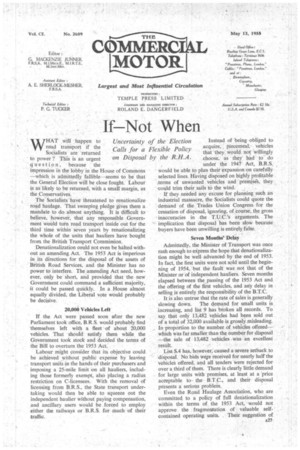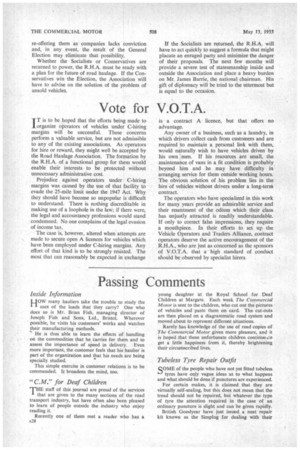If Not When
Page 29

Page 30

If you've noticed an error in this article please click here to report it so we can fix it.
WHAT will happen to Uncertainty road transport if the Socialists are •returned Calls for a to power ? This is an urgent on Disposal q uestion, because the impression in the lobby in the House of Commons —which is admittedly fallible—seems to be that the General Election will be close fought. Labour is as likely to be returned, with a small margin, as the Conservatives.
The Socialists have threatened to renationalize road haulage. That sweeping pledge gives them a mandate to do almost anything. It is difficult to believe, however, that any responsible Government would turn road transport inside out for the third time within seven years by renationalizing the whole of the units that hauliers have bought from the British Transport Commission.
Denationalization could not even be halted without an amending Act. The 1953 Act is imperious in its directions for the disposal of the assets of British Road Services, and the Minister has no power to interfere. The amending Act need, however, only be short, and provided that the new Government could command a sufficient majority, it could be passed quickly. In a House almost equally divided, the Liberal vote would probably be decisive.
20,000 Vehicles Left If the Act were passed soon after the new Parliament took office, B.R.S. would probably find themselves left with a fleet of about 20,000 vehicles. That should satisfy them while the Government took stock and decided' the terms of the Bill to overturn the 1953 Act.
Labour might consider that its objective could be achieved without public expense by leaving transport units in the hands of their purchasers and imposing a 25-mile limit on all hauliers, including those formerly exempt, also placing a radius restriction on C-licensees. With the removal of licensing from B.R.S., the State transport undertaking would then be able to squeeze out the independent haulier without paying compensation, and ancillary users would be forced to employ either the railways or B.R.S. for much of their traffic. of the Election Instead of being obliged to Flexible Policy acquire, piecemeal, vehicles that they would not willingly by the R.H.A. choose, as they had to do under the 1947 Act, B.R.S. would be able to plan their expansion on carefIlly selected lines. }raving disposed on highly profitable .terms of unwanted vehicles and premise's, they 'could trim their sails to the wind. .
If they needed any excuse for planning such an industrial massacre, the Socialists could quote the • demand of the Trades Union Congress for the -cessation of disposal, ignoring, of course, the gross inaccuracies in .the T.U.C.'s arguments. The implication that disposal has been slow because buyers have been unwilling is entirely false.
Seven Months' Delay Admittedly, the Minister of Transport was once rash enough to express the hope that denationalization might be well advanced by the end of 1953. In fact, the first units were not sold until the beginning of 1954, but the fault was not that of the Minister or of independent hauliers. Seven months elapsed between the passing of the 1953 Act and the offering of the first vehicles, and any delay in selling is entirely the responsibility of the B.T.C.
It is also untrue that the rate of sales is generally slowing down. The demand for small units is increasing, and list 9 has broken all records. To say that only 13,482 vehicles had been sold out of a total of 32,000 available is grossly misleading.
, In proportion to the number of vehicles offered— which was far smaller than the number for disposal —the sale of 13,482 vehicles was an excellent result.
List. S.4 has, however, caused a severe setback to • disposal. No bids weo received for nearly half the vehicles offered, and all tenders were rejected for over a third of them. There is clearly little demand for large units with premises, at least at a 'price acceptable to the. B.T.C., and their disposal presents a serious problein.
Even the Road Haulage Association, who are committed to a policy of full denationalization within the terms of the 1953 Act, would not approve the fragmentation of valuable selfcontained operating units. Their suggestion of re-offering them as companies lacks conviction and, in any event, the result of the General Election may eliminate that possibility.
Whether the Socialists or Conservatives are returned to power, the R.H.A. must be ready with a plan for the future of road haulage. If the Conservatives win the Election, the Association will have to advise on the solution of the problem of unsold vehicles. If the Socialists are returned, the R.H.A. will have to act quickly to suggest a formula that might placate an enraged party and minimize the danger of their proposals. The next few months will provide a severe test of statesmanship inside and outside the Association and place a heavy burden on Mr. James Barrie, the national chairman. His gift of diplomacy will be tried to the uttermost but is equal to the occasion.




























































































